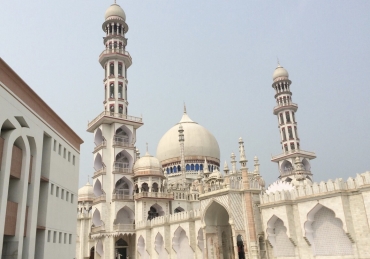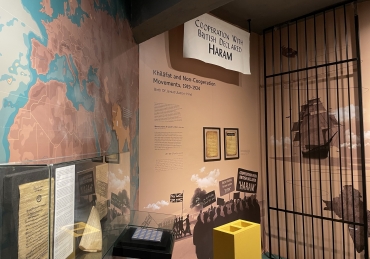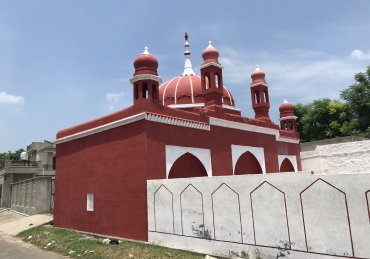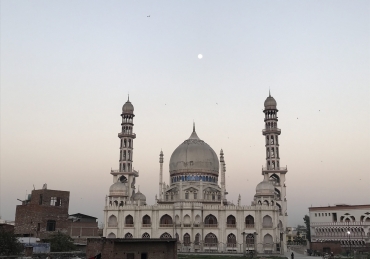An interesting thought provoking article by Shaykh Yusuf Shabbir regarding the need for a comprehensive education system across the Muslim world.
Click on the following link to read in PDF format or read below: Is The Parallel Education System Contributing To The Decline Of The Muslim Ummah
بسم اللہ الرحمن الرحیم
IS THE PARALLEL EDUCATION SYSTEM CONTRIBUTING TO THE DECLINE OF THE MUSLIM UMMAH?
Over the past few years, I have been considering the challenges facing the Muslim Ummah and in particular its decline over the past two centuries. Muslims have collectively become weak in almost every sphere. We have lost our intellectual, spiritual and physical might which we once possessed. Our contribution to civilisation and knowledge is well documented. Our legacy of Andalusia and Baghdad continues to influence the current intellectual discourse and scientific advances. We possessed intellectual dominance and were at the forefront of creativity and innovation. Our ideas were transported to Europe as it lived through the dark ages. Our message penetrated the hearts and minds of many and our lands expanded through the physical, spiritual and intellectual strength we possessed.
Over the past two centuries, the Ummah has faced an unprecedented decline. To change the tide and course of history requires an examination of the factors that contributed to this and its effects. The purpose of this brief exploratory article is not in any way to examine the factors of this multi-faceted issue that can undoubtedly be analysed from different perspectives. The purpose is rather to examine this in light of the education systems that exist today and that existed during the days of glory and whether this has had any impact.
An examination of the history of the previous two centuries reveals that the education system throughout the Muslim world changed gradually and eventually the western system became dominant. This occurred in different parts of the Muslim world in different ways and for different reasons. A key factor in the Muslim education system losing its relevance relates to the changes in the administration and economy introduced by the colonial rulers. Matthew Clarke[1] suggests that earlier Muslim education had relevance to both ‘religious’ and ‘secular’ needs but this changed over time. Even in Turkey, which was never formally colonialised, the recognition by the Ottoman rulers of their declining powers especially their failure to compete with advances in military technology and warfare had resulted in attempts aimed at replicating the Western educational institutions and reforming the Madrasa system. The process was dramatically accelerated by Ataturk after the fall of the caliphate.
In 1866, the American University of Beirut was founded followed by the French St. Joseph’s University in 1875. Foreign missionaries also established schools in Lebanon during this era. These institutions started to fill the gap that was created and sowed the seeds of liberalism and secularism, the effects of which remain today.[2] Eventually, across the Middle East, the western intellectual systems and institutions became dominant to the point that the mainstream national education systems throughout the Middle East today are based on the western model.
A review of the history of the Indian sub-continent reveals a similar trend. Mawlānā Manāẓir Aḥsan Gīlānī[3] and others have affirmed that under the Moghul rule, there was a single education system for all citizens. The establishment of Darul Uloom Deoband occurred at a time when colonialism posed a threat to the fundamental teachings of Islam and was aimed at protecting the Islamic sciences from western influence. It did not aim to establish a permanent national educational system that would be comprehensive and address all the needs of the Muslims. It is important to understand the rationale and context of establishing Darul Uloom Deoband as a part of the solution and not the complete solution. It is perhaps for this reason that Darul Uloom Deoband and its associates started to champion a network of Makātib (supplementary Muslim schools) to protect the fundamental beliefs of Muslims realising the dangers of the national western based education system that had emerged. Establishing such a parallel system was undoubtedly the need of the era and its impact should not be underestimated or undervalued. The parallel system has saved the faith of thousands and preserved Islamic sciences that were under threat. Protection through this method was however not intended to be the end goal and ultimate objective.
The absence of a comprehensive education system has had many negative consequences with varying degrees in different parts of the Muslim world. Statistically, it would be interesting to research the number of Muslims that benefit from a western style institution versus a Muslim institute or those that combine both. It is clear that a societal divide exists in most parts of the Muslim world. The majority of Muslims attend schools and colleges based on the western model whilst a small minority attend traditional seminaries. The result is that most Muslims are moulded through an education system that is primarily based on western principles and ideas. In many parts of the Muslim world, risk management strategies exist for example through the introduction of Islamic studies in the curriculum and encouraging attendance at Makātib but overall the impact and reach is limited. It is a fact that the vast majority of the Muslims are susceptible to the western ideology and its principles through a sustained period of their primitive lives. At a practical level, this is reflected in the divide between ‘professionals’ and ‘religious’ people in countries like Pakistan and neighbouring countries. Across the Arab world, the huge divide between ‘secularists’ and ‘Islamists’ is visible and was clearly reflected in the Arab Spring and its aftermath. The general decline in the spirituality of the Muslim Ummah can be partly attributed to the fact that most Muslims are not exposed to Islamic education or an Islamic education system during their lives. Moreover, the proliferation of schools run by Christian organisations across Asia and Africa in particular is perhaps one of the main causes of the alarming apostasy rates. Efforts to tackle this through Makātib, Tablīgh, Madāris and similar projects are welcome and necessary; however, this in itself is not sufficient to change the tide without a fundamental reform of the education system across all the Muslim countries. What is required is a unified integrated single education system that recognises its legacy, adapts to the needs of the 21st century, necessitates participation for all its subjects and is based on Islamic values and principles.
Another negative consequence of the parallel education system is the artificial segregation between ‘religious’ and ‘secular’ education. In Islam, there is no such segregation. The divide is between beneficial and non-beneficial knowledge. The superiority of the knowledge of the Qur’an and Sunnah and religious knowledge is undoubted. However, the knowledge of what is commonly known as secular or worldly sciences is not prohibited. In fact, Shaykh al-Islām Mufti Muḥammad Taqī ʿUthmānī states that it is farḍ kifāyah (a communal obligation) to acquire knowledge of the worldly sciences because Islam is a comprehensive religion and way of life. Thus, some of the Prophetic statements regarding the virtues of beneficial knowledge apply to all the sciences that benefit others. He adds that this artificial segregation has resulted in an unhelpful division between two groups of people that find it difficult to relate to and interact with each other.
It is important to review our history and recognise that the education system should be an integral part of Muslim life and is intrinsically linked with our spiritual, physical and intellectual strength. Our legacy includes examples of great scholars who were well versed in the Islamic sciences as well as other sciences. They include Ibn Rushd (Averroes), Al-Khwarizmi (Algoritmi), Al-Razi (Rhazes), Ibn Khaldun and others whose contribution is acknowledged by non-Muslims. The example of the companion of the Prophet ﷺ Zayd ibn Thābit (may Allah be pleased with him) who mastered Hebrew and Syriac within a short period demonstrates the artificial nature of the divide. Edicts of earlier scholars prohibiting studying at certain institutions or studying a particular language were due to the inherent risks of western influences in a specific context and not due to the inherent negativity of the subject matter per se.
The absence of a comprehensive education system has undoubtedly contributed to the overall decline of the Ummah. What is required is a fundamental shift in approach; from a parallel system to an integrated single national education system that is balanced, inspired by our legacy, adapted to the modern context and one that is underpinned with religious values and principles. Undoubtedly, this needs to be thought through and involve educationalists, anthropologists, historians and scholars. What surprises me is the contentment of most people with the current parallel system and the absence of a discussion on the alternative. A well thought through integrated education system can strengthen the Muslims spiritually as well as in other ways. An integrated single education system would ensure that every Muslim has the knowledge and practical experience of the fundamentals of Islam. Religious education could be intertwined with other sciences until the age of 16 or 18. Thus, every Muslim would be grounded with an Islamic mind-set and be conscious of his identity and religious responsibilities. Thereafter, pathways could exist to further specialise in Islamic sciences or to pursue a ‘worldly’ science. Whichever pathway is chosen, Muslim students would possess a good foundation in various disciplines including in Islam, languages, mathematics and other sciences that will help further their aspirations. It would also enable change of pathways should one fail to succeed or have a change of heart. Currently, this is not possible in many countries. This would also reduce the divide between the liberal and secular sections of the community and the religious minded sections of the community. This is a gradual process and over time, this would have material impact in strengthening the state of the Ummah.
Another negative consequence of the parallel education system is that it has resulted in the majority of Muslim countries adopting legal systems and methods of governance based on secular values and systems. This includes countries like Pakistan where several laws have been enacted to incorporate certain Islamic teachings but its implementation and remit is limited. Secularism and western values have penetrated all the major state institutions and legal systems. This is because inter alia the education system that moulded the country’s founders was based on secular western values, and despite the promise prior to its establishment, the founders reneged on their promise fearing the dominance of faith over secularism. This vicious cycle of the parallel education system continued with the failed attempt by Mufti Muḥammad Shafīʿ Ṣāḥib to establish an integrated national education system for Pakistan. Mufti Muḥammad Taqī ʿUthmānī[4] explains that his father Mufti Muḥammad Shafīʿ played a leading role in the establishment of the country. His aims included bringing about about a revolutionary change to the education system. He delivered a speech regarding this in the presence of the then Prime Minister Liaquat Ali Khan. In his speech, he made reference to the three Muslim institutions that were established in British India: Aligarh Muslim University, Nadwatul Ulama and Darul Uloom Deoband. Each had a distinctive purpose and served a specific context; however, all three were established to serve an immediate need. As Pakistan is no longer under colonial rule, he proposed a fourth system that integrates the aims of all three institutions and this would be achieved through the development of a single pathway until a certain age and thereafter different pathways as described above.
An integrated national education system is an important prerequisite for the establishment of state institutions and legal systems that are compliant with Islamic laws and for the development of right minded personnel to run these institutions. Without underestimating the difficulty of developing and implementing a national integrated education system, as reflected from the attempt in Pakistan, it is nevertheless necessary for the discussion to begin at a global level.
I conclude with two precautionary notes. Firstly, an integrated national education system should not be confused with the discussion about state regulation. Independence of thought and freedom of expression within the Islamic framework should be at the heart of an integrated Islamic national education system. Secondly, the establishment of Madāris, Makātib and similar institutions play a vital role in protecting faith and the Islamic sciences, especially in the current era with the dominance of the western systems. This article is not an attempt to undermine these institutions but an attempt to begin the discussion to reintroduce the comprehensive education system that existed in the Muslim world and that served all Muslim children; of which these institutions are an important and necessary feature. A fundamental change will not happen overnight and therefore our support for Madāris, Makātib and similar institutions should not be hindered in the slightest.
Yusuf Shabbir
27 Rabīʿ al-Thānī 1436 / 16 February 2015
Footnotes
[1] Clarke, M. Handbook of Research on Development and Religion (2013: 239). Cheltenham: Edward Elgard Publishing Ltd.
[2] For further information, read Anderson, B.S. (2011) The American University of Beirut: Arab Nationalism and Liberal Education. Austin TX: University of Texas Press.
[3] Hindustan Main Musalmano Ka Nizam E Taleem O Tarbiat (1942). Available on www.archive.org. A brief overview is available in the article on this link: http://www.ilmgate.org/some-aspects-of-the-muslim-educational-system-in-pre-colonial-india/.
[4] This is based on extracts from an Urdu speech delivered by Mufti Muḥammad Taqī ʿUthmānī in Masjid Umar, Walthamstow, London on Friday 14 June 2013.







